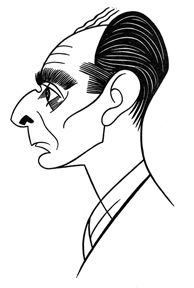Here are 10 things you should know about Helen Hayes, born 120 years ago today. She was known as the First Lady of American Theatre, but she left a legacy in Hollywood, too.
Tag: Helen Hayes
10 Things You Should Know About Ella Raines
Here are 10 things you should know about Ella Raines, born 100 years ago today. She made just 22 movies, nearly half of which were films noir and crime thrillers.
Happy 98th Birthday, Teresa Wright!
Quintessential girl-next-door Teresa Wright was born Muriel Teresa Wright 98 years ago today in New York City. Here are 10 TW Did-You-Knows:
- Wright was born in Harlem, but her parents divorced when she was very young, after which she lived primarily in Maplewood, New Jersey.
- Wright was inspired to take up acting as a teenager when she saw Helen Hayes perform in a production of Victoria Regina.
- Having launched her professional career at the Wharf Theatre in Provincetown, Massachusetts, she started going by her middle name professionally when she learned there was already another Muriel Wright in Actors Equity.
- Her Broadway debut came in Thornton Wilder‘s Our Town; she was initially cast in a small role and as the understudy for the lead role of Emily Webb, but when the original lead, Martha Scott, answered the siren song of Hollywood, Wright took over the lead role.
- Wright’s Hollywood debut saw her starring with Bette Davis in The Little Foxes (1941). Wright remains the only actor to have been nominated for an Academy Award for her first three motion pictures: The Little Foxes (supporting actress), 1942’s The Pride of the Yankees (best actress) and Mrs. Miniver (for which she won the Oscar for Best Actress in a Supporting Role).
- Wright is one of 10 actors to have been nominated for Academy Awards in both the Best Supporting and Best Lead acting categories in the same year. The others are are Fay Bainter, Barry Fitzgerald, Jessica Lange, Sigourney Weaver, Al Pacino, Emma Thompson, Holly Hunter, Cate Blanchett, Julianne Moore and Jamie Foxx.
- Her first husband, Niven Busch, wrote the female lead in Duel in the Sun (1946) with Wright in mind, so that she might break out of her girl-next-door rut, but she discovered she was pregnant and the role went to Jennifer Jones.
- Wright was among the earliest movie actors to work on television. Her first appearance came on Robert Montgomery Presents in 1952, and she went on to appear as a guest or a star in more than fifty more series and TV movies.
- In the 1950s and ’60s, Wright also worked frequently on the stage—on Broadway, in regional theatres and in touring companies.
- Wright died of a heart attack on March 6, 2005. On July 5 of that year, during Old-Timer’s Day festivities at Yankee Stadium, her name was included in a list of former Yankees and other members of the Yankees family who had passed away in the previous twelve months because of her memorable performance as Lou Gehrig‘s wife, Eleanor, in Pride of the Yankees.
Happy birthday, Teresa Wright, wherever you may be!

Times Square Tintypes: Ring Lardner
In this chapter from his 1932 book, Times Square Tintypes, Broadway columnist Sidney Skolsky profiles sportswriter, author, and playwright Ring Lardner.
HE’S FUNNY THAT WAY
RING LARDNER. He came to New York to do nothing and has been a failure ever since. Was born in Niles, Mich. The great event took place forty-six years ago. Always looks seven years younger than he really is.
Elmer the Great was his first play. While it was current he made his friends call him “Fanny.”
In the way of drinks his taste runs to any glass that is filled with anything but champagne. Champagne makes him nauseous.
As a newspaper man he worked in crowded offices with people talking and writing all around him. Today he can’t even begin to work if there is anybody else in the room.
He has never murdered anybody. If he does you can lay two to one that the party will be the author of a poem, story or play that is the least bit whimsical.
Occasionally he spends an entire day in a restaurant.
Was once paid five hundred dollars by a pottery concern to make a speech at their annual convention.
His first magazine story was about ball players. He sent it to the Saturday Evening Post. Not only did they buy the story but they encouraged him to write the now famous “You Know Me Al” yarns.
He’d rather be alone than with anybody excepting four or five people. He believes this is mutual.
Was among those who were the guests of Albert D. Lasker on the Leviathan‘s trial trip. While he was on the boat, he never saw the ocean.
Whenever he wants to laugh he goes to see Will Rogers, Ed Wynn, W. C. Fields, Jack Donahue, Harry Watson and Beatrice Lillie. If it is acting that he desires to see he hurries to a play with Alfred Lunt, Walter Huston, Lynn Fontanne or Helen Hayes. Otherwise he attends the opera.
He has flat feet.
Doesn’t care for parties. Unless he is giving them. Because then he can order as often as he likes.
Was fired from the Boston American in 1911. Went back to Chicago, his favorite shooting gallery, and asked the Chicago American for a job. The managing editor inquired: “What was the matter in Boston?” He replied: “Oh, nothing; except that I was fired.” The managing editor said: “That’s the best recommendation you could have. Go to work.”
Is the author of the following books: The Love Nest, What of It? How to Write Short Stories, Gullible’s Travels, The Big Town and a modest autobiography titled: The Story of a Wonder Man.
He can play the piano, the saxophone, the clarinet and the cornet. But not so good.
Has what is called “perfect pitch.” That is, he can tell which key anyone is singing or playing in without looking or asking. Once won $2 at this stunt. It really isn’t an accomplishment he can live on.
He is a passionate collector of passport pictures and license photographs of taxi drivers.
Among the things that annoy him are writing letters, answering the telephone, signing checks, attending banquets, untying the knot in h is shoelace, filling his fountain pen and trying to find handkerchiefs to match his neckwear.
Before he dies he hopes to write a successful novel. Believe he is going to live to a ripe old age.
Begins his stories with just a character in mind. Hardly ever knows what the plot is going to be until two-thirds through with the story.
He dislikes work (except the writing of lyrics), scenes like the Victor Herbert thing in the 1928 Scandals, insomnia, derby hats, beauty marks, motion pictures (excepting those Chaplin is in), dirty stories and adverse criticism—whether fair or not.
The W is for Wilmer.
He was standing at a bar in New Orleans during Mardi Gras time three years ago and a Southern gentleman tried to entertain him by telling how old and Southern and aristocratic his family was. Lardner interrupted the Southerner after twenty minutes of it with the remark that he was born in Michigan of colored parentage.
Recently he offered a cigarette concern this advertising slogan: “Not a Cigarette in a Carload.” They didn’t accept it.
He is noted for sending funny telegrams. One of the most famous is the one he sent when he was unable to attend a dinner. It read: “Sorry cannot be with you tonight, but it is the children’s night out and I must stay home with the maid.”
Times Square Tintypes: Molly Picon
In this chapter from his 1932 book, Times Square Tintypes, Broadway columnist Sidney Skolsky profiles actress and star of the Yiddish Theatre Molly Picon.
THE GHETTO GIRL
MOLLY PICON. The darling of East Broadway.
She is always asking questions.
Her one disappointment in life is that she wasn’t born a boy.
Made her stage début as an infant prodigy at amateur nights. In those days she was “Baby Margaret.” Ten years ago in Boston she deserted vaudeville for the Yiddish stage by joining a Jewish burlesque show. She speaks English better than many actors on Broadway.
Has a mania for French dolls. Her apartment is cluttered with them.
She writes the lyrics of all her songs. For every show she learns something new. She can sing, dance, perform feats of magic, play six different musical instruments and do acrobatic tricks.
Hates to talk on the telephone. If she is home alone she never answers the phone but lets it keep on ringing.
In every play she wears a dress suit. She owns one dress suit with three pairs of paints.
Always sits with her feet on the chair.
She is married. When she first met her husband, Jacob Kalish, he never combed his hair, shined his shoes or pressed his trousers. She told him that if he dolled up she’d marry him. He immediately bought three suits and invited her to his house. He then changed suits every half hour. There was nothing left for her to do but marry him. She proudly states that he can make love to her in six different languages.
She carries Jewish luck charms given to her by rabbis.
Whenever she has a new dress she goes to the Royal Café. This is the Reuben’s, Sardi’s and Algonquin of Second Avenue.
Is always putting her fingers in her mouth but never bites her nails.
When it comes to naming a favorite actor and actress, Charlie Chaplin and Helen Hayes head her honor roll.
She has performed in Russia, Roumania, Galicia, Jerusalem and Austria. The results of this tour were a gift from Queen Marie of Roumania, the finding of Joseph Rumshinsky (he now writes the music for all her plays) in Vienna and the naming of two gardens after her in Jerusalem.
During intermission she always drinks a glass of tea with lemon.
Offstage she never uses powder, lipstick or perfume. She doesn’t smoke.
She wears both nightgowns and pajamas. She buys neither. It is the custom of the Yiddish theater to have a “Testimonial Evening” once a month. On these occasions she receives nightgowns and pajamas from admirers.
When she was born the midwife looked at her and said: “Nebesh—poor kid.” Her mother didn’t kiss her until she was a year old.
Is actually afraid of people who talk figures. Has no head for business. Her husband arranges all her financial affairs.
She gets a big kick out of reading poetry and visiting the Metropolitan Museum of Art. Her favorite author is Ben Hecht. In her opinion One Thousand and One Afternoons in Chicago is one of the finest books ever written.
D. W. Griffith is her most ardent admirer. He intends to star her shortly in a talking picture.
She lives with her husband, mother and sister. Her husband is a part owner of Kessler’s Second Avenue Theatre, where she performs. Her mother is a wardrobe mistress at that theater. Her sister does the cooking for the family. They keep a kosher house. Outside, however, Molly loves to go to a Chinese restaurant and eat roast pork.

